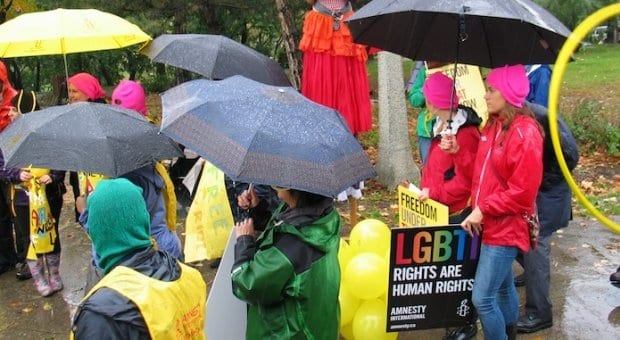There’s no reason you can’t combine advocating for human rights with having fun.
Approximately 30 protesters, including people dressed up like bears, pirates and circus performers, gathered outside the University of Ottawa on Oct 7 to take part in an Amnesty International demonstration to promote freedom of expression in Russia.
Despite the pouring rain, the demonstrators were in good spirits as they marched down Laurier Avenue waving placards promoting human rights and carrying umbrellas. The stilt performer had to duck under low branches as the group proceeded to the Russian embassy.
Dressed in a bear suit, Alex Neve, the secretary-general of Amnesty International Canada, spoke to the crowd about the Olympic torch rally, which was launched Oct 6 by Russian President Vladimir Putin for next year’s Winter Olympics in Sochi.
“What we want to ensure is that everywhere that torch goes over the coming four months it also takes with it a message of respect for human rights,” Neve said.
Yet with the eyes of the world on Russia, the human rights violations continue against LGBT people, human rights activists and journalists, he said.
“We’re not gaining ground; we’re losing ground, and that goes against everything the Olympics stand for,” Neve said. “We’re seeing massive violations, growing violations of the essential rights to freedom of expression, freedom of assembly and the right to peaceful protest.”
Prisoners of conscience and peaceful protesters — including two members of Pussy Riot — remain imprisoned, which Amnesty and other defenders of human rights consider unacceptable, he said.
“Now we have the absurdity of piracy charges against Greenpeace environmental activists,” he said. “This cavalier disregard for freedom of expression is not worthy of an Olympic host.”
The local, national and international rallies and demonstrations held by human rights activists, LGBT community members and their allies to protest the treatment of queer people in Russia must continue, he said.
“The hateful new homophobic legislation that is absolutely targeting lesbian, gay, bisexual, transgendered and intersex individuals in Russia [has] obviously attracted global outrage,” Neve said. “It’s outrageous that that has happened as the Olympics draw closer.”
In an interview with Xtra, Neve says Amnesty International isn’t calling for the Olympics to be moved from Russia, but he says having Russia as the host country is a crucial opportunity to implement human-rights reforms.
Robyn Brehaut, who attended the demonstration wearing colourful clothing, long fake eyelashes and carrying hula hoops, says incorporating costumes and a celebratory attitude is a good approach to spreading an important message.
“I think it keeps it peaceful and happy and joyful, and I think the message is better received in that light,” she says.
Representing hula hoop and circus arts organizations HoopBloom and Mini Cirque, Brehaut urges people to speak out to support human rights reform in Russia.
“Have your voices heard,” she says. “Share the message through social media so that everyone in Russia knows that we are in support of them, we’re behind them and our hearts are with them.”


 Why you can trust Xtra
Why you can trust Xtra


